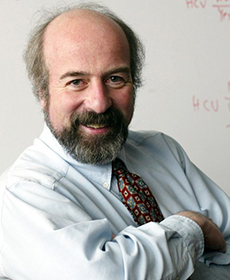World Cancer Day: How JHSPH Researchers are Confronting Cancer
Observed on February 4, World Cancer Day seeks to "unite the world's population in the fight against cancer." Here's how six JHSPH researchers are confronting cancer on diverse fronts.

Tobacco
Joanna Cohen
Health, Behavior and Society, Institute for Global Tobacco Control, Bloomberg Professor of Disease Prevention
Cohen's research focuses on the factors that affect the adoption and implementation of public health policies and on evaluating the beneficial effects and the unintended consequences of such policies. Trained in epidemiology and health policy, Cohen has worked on studies of both U.S. and Canadian legislators regarding tobacco and tobacco control policy, a longitudinal cohort of smokers focusing on factors influencing quitting behavior, tobacco promotion at the point of sale, tobacco prices including taxes, tobacco packaging, options for reducing the physical availability of tobacco products, and tobacco industry interference in tobacco control.
- Biomarkers of Secondhand Smoke Exposure in Waterpipe Tobacco Venue Employees in Istanbul, Moscow and Cairo
- Internet Search Query Trends Reveal Significant Public Health Interest in Heat-Not-Burn Tobacco Products

Informing Risk
Gypsyamber D’Souza
Epidemiology, International Health
Amber D'Souza focuses on infectious causes of cancer. Her current research focuses on health of high-risk groups, communication of risk, and translation of epidemiologic findings. She leads a research program related to human papillomavirus-related cancers, including screening, prevention, and survivorship issues for oropharyngeal, cervical and anal cancers. She also studies cancer among people living with HIV and co-leads the MACS-WIHS Combined Cohort Study datacenter. D'Souza is involved in several large collaborations and advisory groups focused on building study populations and scientific infrastructure for team science, communicating expert opinion and informing both public and policy.
- MOUTH Study: Men Offering Understanding of Throat HPV
- CDC Webinar—Perspectives on Oropharyngeal Cancer: Scientific Overview, Clinical Expertise, and Personal Experience
- Cervical Cancer Screening Intervals and Management for Women Living with HIV: A Risk Benchmarking Approach

Environmental Carcinogens
John Groopman
Environmental Health and Engineering, Center for Human Nutrition
The research in Groopman’s program involves the development and application of molecular biomarkers of exposure, dose and effect from environmental carcinogens, including naturally occurring agents in the diet as well as those produced as a result of cooking practices. A major emphasis of the research has been in the elucidation of the role of aflatoxins, a common contaminant of the food supply, in the induction of liver cancer in high-risk populations living in Asia and Africa. This work has led to the identification of a strong chemical-viral interaction between aflatoxin and the human hepatitis B virus in the induction of liver cancer. These biomarkers have also been used in many collaborative molecular epidemiology studies of liver cancer risk and recently employed to assess the efficacy of a number of chemopreventive agents in trials in high-risk aflatoxin-hepatitis B virus–exposed populations. This research is now being extended to develop genetic biomarkers of p53 mutations and viral alterations in human samples as early detection of disease biomarkers using a novel mass spectroscopy–based method for genotyping developed in the laboratory. Thus, the research in Groopman’s laboratory focuses on the translation of mechanistic research to public health based prevention strategies.
- Liver Cancer on the Rise, Aflatoxin Contributes
- Detoxification of Air Pollutants in Humans with a Broccoli Supplement

Viral Infections
Greg Kirk
Epidemiology, AIDS Linked to the Intravenous Experience (ALIVE), Center for AIDS Research, Center for Global Health, Johns Hopkins University Global mHealth Initiative
Kirk’s research focuses on understanding the natural history of viral infections, particularly HIV and the hepatitis viruses, in both domestic and international settings. The ALIVE (AIDS Linked to the Intravenous Experience) study is a long-standing and productive cohort that characterizes the natural history of HIV infection among intravenous drug users in Baltimore, MD. His research in ALIVE ranges from pathogenesis to clinical to behavioral. In particular, Kirk focuses on the non-AIDS outcomes of HIV including cancer, liver and lung diseases. He also works on related topics with international collaborators, primarily in Africa. His research employs clinical, imaging and “omic” (genetic, epigenetic, proteomic) methods to help understand and identify individuals at greatest risk for clinically relevant outcomes from HIV, HBV and HCV infections. The long-term goal of this research is to translate this information into targeted interventions to help reduce the burden from these infections.

Genetic and Epigenetic Factors
Elizabeth Platz
Platz is a cancer epidemiologist whose research on prostate and colon cancers sits at the interface of epidemiology and basic science. Within prospective cohorts, she studies the association of genetic and epigenetic factors as well as circulating markers of androgenicity, inflammation and oxidation with prostate cancer incidence and recurrence. For colorectal neoplasia, her work focuses on metabolic syndrome, growth factors and inflammation as sequelae of adiposity. She also studies the role of modifiable factors that influence these pathways, such as diet and lifestyle, in relation to the incidence of these diseases and other men’s health concerns. In addition, she studies these factors in association with benign conditions of the prostate and colon, including benign prostatic hyperplasia and adenomatous polyps. She has a long-standing interest in uncovering explanations for the notably higher rate of prostate cancer in African-American compared to white men, including racial variation in sex steroid hormones in the in utero milieu and throughout life.
- Periodontal Disease Assessed Using Clinical Dental Measurements and Cancer Risk in the ARIC Study
- More Evidence of Link Between Severe Gum Disease and Cancer Risk

Global Cancer Disparities
Anne F. Rositch
Epidemiology, Center for Global Health
Anne F. Rositch is an applied epidemiologist, concentrating on cancer in women and global cancer disparities, with a background in basic science and experience conducting international field-based research. For over 10 years, her research has focused on cervical cancer in HIV-positive individuals and aging women and in low-resource settings. It has spanned the translational spectrum from epidemiological studies to understand the natural history of the disease, to studying the effectiveness and implementation of cervical cancer prevention in low-resource settings. Rositch has ongoing research in Baltimore and South America and across sub-Saharan Africa. Her recent work is focused on leveraging her training in implementation science and experience in cervical cancer prevention to identify novel multidisciplinary and multilevel approaches for breast cancer control in low-resource settings. Rositch’s current research program has three main areas: epidemiology and prevention of HPV and invasive cervical cancer in aging and older women; effectiveness and implementation of novel cervical and breast cancer prevention and control programs in high-risk populations and in low-resource settings including Peru, Tanzania, Kenya and South Africa; and cancer and HIV, with a focus on treatment and survival disparities and on defining features of non-AIDS defining cancers in people with HIV/AIDS.
- Cervical cancer death rates are much higher than thought, study says
- HPV Self-testing and Cervical Cancer Screening Coverage
Related:
- The Patient Researcher: When survivors and scientists meet in Anthony Leung’s lab, it’s clear that cancer research isn’t just about molecules.
- Bridging Cancer’s Great Divide: Six epidemiologists seek to eliminate disparities in cancer incidence and outcomes.
